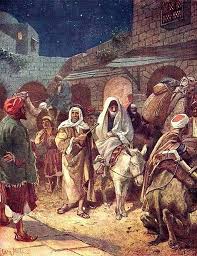
The Inn at Bethlehem Was Once A Home … But Whose Home?
Yes! There was indeed an Inn at Bethlehem. But its history now reveals that it was more than just another inn. It was the ancestral home of Judaism's most renowned figure. While it is true that there were many inns in the country of Judah or Israel by the first century, it is not true that all inns were created equal. The location and owner of an inn made all the difference in what it had to offer patrons.
Inns located in remote locations were often nothing more than a walled in area complete with a well as a water source, several pens to hold animals, a cooking and warming fire pit with the innkeeper’s house located in the middle. Travelers would come into the enclosed and gated area to pitch their tents or simply throw down a matt against the inner wall. A night’s stay at this type of inn was inexpensive and a safe place to sleep. The innkeeper may or may not have provided a meal.
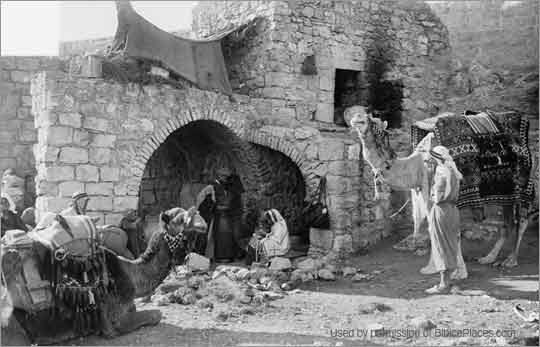
The Inn at Bethlehem, having been originally built as a home, was more in keeping with what we would today think of as a traditional hotel. There would have been a large room on the first floor just inside the front door for checking in, eating and drinking. There would be other rooms with mats arranged along the walls for single male travelers to sleep. There would be still other rooms shared by families. The inn would have been surrounded by a walled courtyard where people could camp for a small fee. It would also have a stable available to accommodate pack animals and usually a boy to feed and guard the animals overnight. The Inn at Bethlehem is well documented in Scripture as well as ancient supplemental writings. But it is the original owners of this property that make it heads above the other inns of Judah.
The story of the Inn at Bethlehem having once been a home begins interestingly enough in 1,300 B.C. with a famine and a Jewish couple that decides to leave Bethlehem in the hopes of creating a living elsewhere. The man, with his wife Naomi and two sons, moves to the gentile country of Moab. The husband dies and while the two sons marry, they both also die. Impoverished and alone, Naomi decides to move back to Bethlehem and live from hand to mouth. One of her Moabite daughters in law by the name of Ruth, volunteers to go with her. The two arrive in Bethlehem so indigent that Ruth goes into the fields at harvest time to gather up the scraps of grain to make bread. There she catches the eye of a very powerful and wealthy man named Boaz (Ruth 2:1-4).
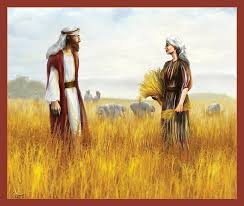
Boaz is the son of Salmon and his grandfather was Nashon, whose uncle was Aaron the brother of Moses. Nashon was the chief of the tribe of Judah at the time of the Exodus and died in the wilderness with the rest of his faithless generation. Salmon, his son, then became chief of the tribe of Judah and crossed into the promised land under the leadership of Joshua.
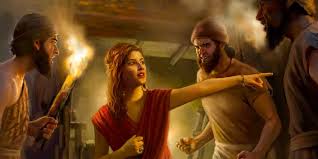
The first planned conquest of the Promised Land by Joshua was to attack the Canaanite capital city of Jericho. The decision was made to first send two spies into Jericho to ascertain its overall military strength. Oral tradition states that Salmon was one of these two spies. They stayed with an innkeeper named Rahab. The Talmud along with the Book of Joshua states that Rahab was a harlot and an innkeeper (Joshua 2:1). After the fall of Jericho, Salmon becomes engaged to Rahab. In turn, she converts to monotheism and lives the remaining years of her life as a loving wife, mother and respectable woman. In fact the word rehabilitation comes from her name. Salmon and his wife Rahab move to Bethlehem a village located 3 miles south of the ancient city of Salem later renamed Jeru 'salem'. The oldest reference to the village is found in an Egyptian correspondence dating to 1,400 B.C. where it is called Bit-Lahmi. Salmon, as chief of the tribe of Judah, decided to make this village the county seat of the tribal territory of Judah.
On a side note, the entire area of the Promised Land would eventually become known as Judah. In 63 B.C. the invading Romans would give the slang pejorative name of Juds or Jews to all the inhabitants of this land. In 70 A.D., the Romans destroyed the nation of Judah and as an added insult, renamed it Philistine after Israel's most hated enemy. The Philistines are mentioned by the Egyptian Pharaoh Merneptah in 3,429 B.C. The current name Palestine is a corrupted derivative of this more ancient name Philistine. In 1965, an Egyptian named Yasser Arafat continued this insult to the resident Jews by calling the current Bedouin tribes living in the land "Palestinians". However, ancient skeletal DNA remains show that the direct descendants of the Philistines are currently living in Lebanon having been driven north out of the land by King David around 1,000 B.C.

On the other hand, the most current DNA samplings taken from populations living in Israel show that at least half the ancestry of the Jews and Arabs is Canaanite. This makes sense as the most ancient name of the land was Canaan named after Noah's cursed grandson who was the biological great grandson of Cain. To learn more about why Noah cursed his grandson and how Cain's gene pool survived the flood. See related paper: "Who Killed Cain?"
Salmon and Rahab had a son name Boaz who had a son named Obed who had a son named Jesse who had a son named David (Ruth 4:20-22). It was David who became the second King of the nation today known as Israel (Samuel 16:10). The name Israel came from God who used it when He renamed Jacob. Jacob was the great grandson of Abraham (Genesis 35:10).
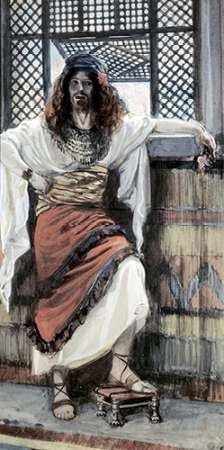
It is during the forty year reign of King David that his eldest son Absalom organized a coup against him (II Samuel 15). Events transpire so quickly that David is forced to flee into the land of Israel or Judah for his life.
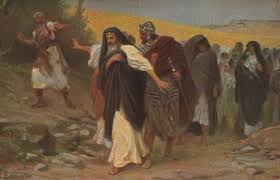
David immediately begins to organize an army of the willing to take back his throne. Some people helped him in this campaign and some did not. David meets an enthusiastic supporter by the name of Barzilla the Gileadite who is apparently a man of wealth (I Kings 2:7; II Samuel 17:27-29; Jeremiah 41:17-18). He provides David with much needed supplies to help his army survive in the countryside. David later defeats the army of Absalom and once again reigns as King.
David then personally returns to Barzilla and offers him a place to reside in Jerusalem where he would be free to live out his life in luxury. Barzilla thanks him for his generosity but says that he is old and wants to die in his own land in his own home. He then asks David if he would instead take his son Chimham back to Jerusalem to lives (II Samuel 17:27-29; II Samuel 19:31-40). David agrees and says, “Chimham shall go with me and I will do to him whatever shall seem good {or right} to you and whatever you shall ask of me, that I will do for you.” (II Samuel 19:38). Chimham then returns with David to Jerusalem.
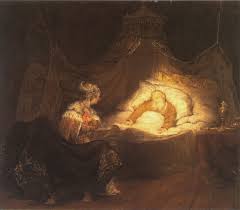
Many years later as David nears death, he commands of his son Solomon, “But show kindness unto the sons of Barzillai the Gileadite, and let them be of those who eat at your table: for so they came to me when I fled because of Absalom your brother” (I Kings 2:7). Obviously, David cared very much for the family of Barzillai and in particular his son, Chimham. He saw himself as forever in their debt for saving his life, his family lineage and his Kingdom.
To recap, David’s eldest son initiates a coup that threatened David’s throne and his life. David is suddenly a man on the run in the wilderness with a bounty on his head. If he is captured, he will be executed. David must put together an army of men, train them, feed them, attack and defeat the national army of Israel. He is experiencing the most serious threat of his entire 40 year reign as king. Some of his subjects respect and help him but some do not. Barzilla provides David with the support he desperately needs if he is to succeed in regaining his throne. So, what do you think you would owe this man for giving you back your life, your family, throne and Kingdom? With that in mind, you can imagine David would give this man’s son Chimham anything he wanted. He would receive honors, a title, an estate with farm land, a lifetime pension, a standing invitation to attend all royal events and the privilege of eating regularly at the King's table.
Earlier in his life, David killed Goliath and was later crowned King by the prophet Samuel. It was then clear to his father Jessie that he was obviously the anointed one of God (I Samuel 16:10-13). This meant that Jessie's actual first born son's rights and privileges would now instead be bestowed upon David. This in turn meant that David had the traditional double portion of Jessie's ancient family estate given to him. Today we would say that David was appointed Executor of the Estate. This also gave him clear title to his ancestral home. This is the exact same tradition we see today with British Kings and members of the royal family. They continue to appoint their first born sons to oversee all family owned land and housing. The first born gets the major manor house. He is then tasked with dividing other homes and land equitably among his brothers according to birth timelines. The first born is also responsible for seeing that their sisters are taken care of and marry well.
So, while David as King now lives in a newly constructed {recently excavated} royal palace in Jerusalem, he also has free and clear title to his boyhood home and land holdings in Bethlehem. This would help explain the understanding that he gifted this estate to the son of the man that saved his life and made this act of generosity possible. This transfer of property that occurred around 980B.C., appears to have been recorded in the ancient Jewish writings of the Targum Yer. It reads: “There was a gerut {or inn} owned by Chimham near Bethlehem” (II Samuel xix 37-40)
Around 588B.C. the prophet Jeremiah gives us more information concerning the home of Chimham being used as an Inn. The Book of Jeremiah tells us about a band of men who, looking to avoid an impending battle, consider where they could go and stay until tempers calmed down. Jeremiah writes, “And they went to a place {structure} called Ge Ruth-Kimham which is located on the outskirts of the village of Bethlehem and dwelt {stayed} as travelers in the habitation {home} of Kimham from there to go {escape} into Egypt” (Jeremiah 41:17). On a side point, it is interesting to note that the Inn is only 58 miles north of the Egyptian border. This fact fits well with the story of Joseph and Mary quickly escaping from Herod by also fleeing Bethlehem south into Egypt (Matthew 2:13).
So now we know for certain that there was a place in Bethlehem for travelers to stay known as the Ge Ruth-Chimham Inn. We know how the name Chimham became attached to the Inn. But what does the word Ge-Ruth mean? Unfortunately, this word is only used once in the Bible so we cannot make a comparison of its usage in order to get a better understanding of its meaning. The word Ger is taken by Jewish Biblical scholars to mean a lodging place as with an inn. It can also be taken to mean, a place of habitation or home or the modern equivalent of a bed and breakfast where the owner lives in the establishment. So, the word ger could literally mean the home of Chimham that also serves as an Inn. Figuratively, it can also mean a house or any structure that serves as a place for travelers to stay. But here is where the definition of this word Ger becomes prophetic. According to the Abarim Bible Dictionary, the word Ger means, “An inn of longing {desire} for liquidity {smooth and unconstrained} in movement in the exchange of knowledge and wisdom”. WOW! Tell me these are not perfect terms to be associated with the birthplace of Christ.
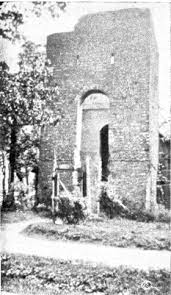
One might think it impossible that the ancestral home of the great King David would ever be allowed to become a public inn. However, we only need look in our own backyard to see how little many American generations value their past glorious histories. For example, the fort established in 1607 known as Jamestown was quickly abandoned in favor of the Williamsburg location. The fort was allowed to deteriorate to the point it was torn down by the land owner, plowed over and used for hundreds of years to grow crops. Many of the homes of the signers of the Declaration of Independence were allowed to be pulled down as unlivable ruins. The home of Thomas Jefferson was auctioned off to the highest bidder after his death and was bought and sold many times by various families. The list goes on and on.
So, the word Ge or Ger refers to a lodging. But what about the inclusion of the name Ruth? It makes complete sense that Chimham would have included Ruth in the Inn's proper name. When Boaz died, the estate would have now been owned by Ruth who was the great grandmother of King David who inherited the estate and gave it to Chimham (Ruth 4:10). So, by the first century, the house that was once the revered home of David, was now serving as an Inn located within the sprawling village of Bethlehem. While the building was commonly referred to as simply, “the Inn at Bethlehem", the Inn was properly known as the Ge Ruth-Chimham Inn as stated by Jeremiah.
The history of the Inn would have been well known to Joseph as he was from the tribe of Judah. Therefore, Joseph either intentionally took Mary there as he saw it fitting that Jesus be born in the actual house of David. Or, the Inn was simply convenient to Mary who was in labor. But whatever the case, while the rejection of the couple from the Inn was shockingly callous, it apparently was always part of God’s secret plan that we later see unfolding in the storyline. To understand this idea, we need to review the sequence of events that caused Joseph to initially go to the Inn, and God's plan to instead have Jesus unceremoniously born in a stable.
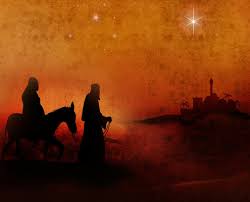
Joseph is entering Bethlehem when Mary suddenly goes into labor. Perhaps the Inn just happens to be conveniently located there on the side of the road. Or, Joseph in keeping with His own place of birth plan, continues a little further into the village until they reach the Inn. Joseph must have expected to have immediate access to a room where Jesus could be born. Then, once it could be said that Jesus was born in the ancestral home of David, Joseph would have moved his family out of the Inn and into a house in Bethlehem (Matthew 2:11). So, Joseph goes into the Inn and asks to rent a room for the night. He is not only shocked that God has not made a room available for them, but he now has a pregnant wife about to give birth literally in the street in front of the Inn. So, he makes a hasty command decision and hurriedly takes Mary into the stable located directly adjacent to the Inn. This particular stable was located in a shallow manmade cave which kept both animals and supplies cool in the summer and well protected year round from thieves. There are literally hundreds of natural and manmade cave to be found throughout Israel. While the idea of Jesus being born in a stable among lowly domesticated pack animals is disconcerting to the modern reader, this was not particularly unusual for peasants in first century Judah (Luke 2:7). Children were regularly born in wilderness camp sites, natural caves or any place that could provide temporary protection from the elements.
What an ironic and ominous foreshadowing twist of fate. Jesus was literally, figuratively and prophetically rejected from the House of David. This scenario perfectly sums up Jesus’ ministry to the Jews. He appeared suddenly to them as a lowly and humble messenger from God. He only asked them to listen and consider what He had to say. He performed miracles that both healed the suffering and provided food for the hungry. He preached hope to the hopeless and told of God's great love and mercy for His chosen people. He spoke truth to power and only ask that each person decide in their own time and in their own way who He was. But, most only took what physical help He could offer, then abandoned Him in His time of persecution. Ultimately, He was convicted of sedition against the Roman state and crucified outside the walls of Jerusalem among common robbers and murders.
Joseph was no doubt apologetic to Mary and confounded in own His mind. He knew that Jesus was the Anointed One of God, so why would God put him in such a precarious position? He was now reeling from the understanding that the situation called for him to personally deliver his own child, the future Messiah of Judah. And while all Jewish boys and girls were trained in how to deliver a baby, few were ever forced into this situation. Joseph's anxiety was furthered heightened knowing that the birth would take place in the filthy stable of a public inn surrounded by pack animals and hired stable hands. Today we would like to think that the Inn keeper at least sent a midwife and blankets, but nowhere is this mentioned in Scripture. In fact, Scripture does not even state that the Innkeeper offered them the stable as an option to get them out of the public eye. It seems Joseph may have made the decision out of pure unadulterated desperation. So, in actually, he was now trespassing on private property! This was not remotely the way Joseph had envisioned this beatific and momentous event. Little did he know that this appears in hindsight to have been exactly in keeping with the prophetic plan of God concerning the ministry of Jesus.
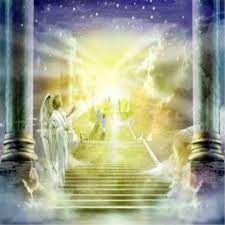
At this time in Heaven, Jesus' spirit as the Word of God, quietly left the Throne of God with a Royal angelic entourage and descended into the physical world He created. There He indwelled the tiny fragile body of a newborn infant in a stable. Thus, He came into the world quietly, humbly and lowly.
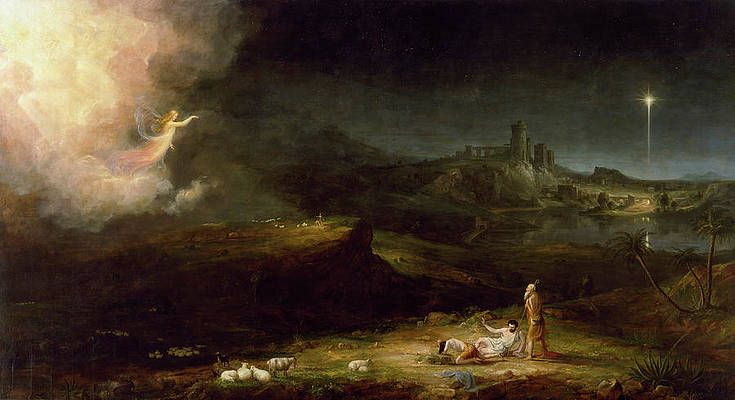
It was this same angelic entourage that then went out into the grazing fields of Bethlehem to announce and celebrated in song the birth of the world's Savior to a group of shepherds (Luke 2:7,13-15). Please read paper “Accurate Date of Birth of Jesus”
The very first visitors to come and see Jesus that night while He was still in the stable were these same shepherds who were considered the lowest cast of people in Judean society.
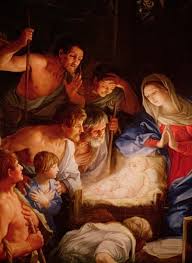
Jesus was then visited six months later on December 25th by wise men or Magi from the East who brought him gifts of gold worthy of a King, incense worthy of a High Priest and myrrh worthy of the First Fruit of the Resurrection.
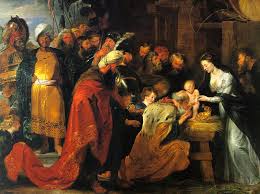
On a closing note, traditionally after a Jewish child was born, the mother would literally hold the newborn in her arms and clean away any blood with water. Then she would rub her child with salt for antiseptic purposes and wrap it in clean linen swaddling clothes. Only then would she lay her newborn to rest in a cradle. However, in the case of Jesus’ birth, Mary literally laid Him to rest in a carved stone trough or manger used to feed and water the animals of the Inn’s guests.
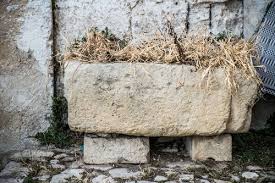
Prophetically and unbelievably, at Jesus’ crucifixion, Mary once again held her first born son in her arms. She washed away His blood with water, watched as He was rubbed with salt and other spices, wrapped in a clean linen burial shroud and taken to a borrowed tomb. There He was then laid to rest in a carved stone shelf (Luke 2:7, 27:59-60; John 19:25).
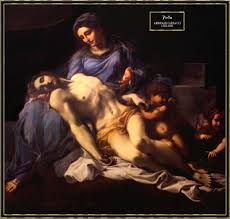
So at His birth, Jesus was literally rejected by the literal House of David. During His ministry, He figuratively represented all that was righteous in the eyes of God yet, at the same time, He made public all that was morally lacking in the religious leadership of Israel. But prophetically, He still was the Savior of all those wise men who would seek to know Him (Matthew 2:1-2,11; John 12:20-23).
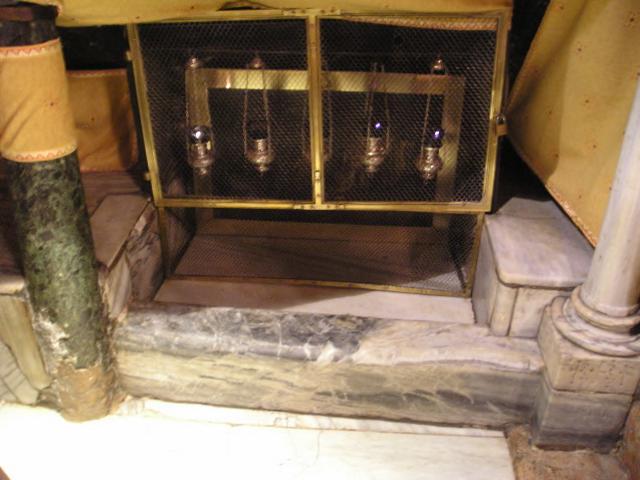
The actual stone trough or manger Mary used, was carved into the cave wall and can still be seen in the Church of the Nativity in Bethlehem. Please see related, "Away In A Manger". By the end of the first century, Christians believed that Jesus was born in a cave. Justin Martyr (100A.D.-165 A.D.) an early Church apologist, wrote that Jesus was born in a cave (The Ante-Nicene Fathers, Vol 1, pg.237).
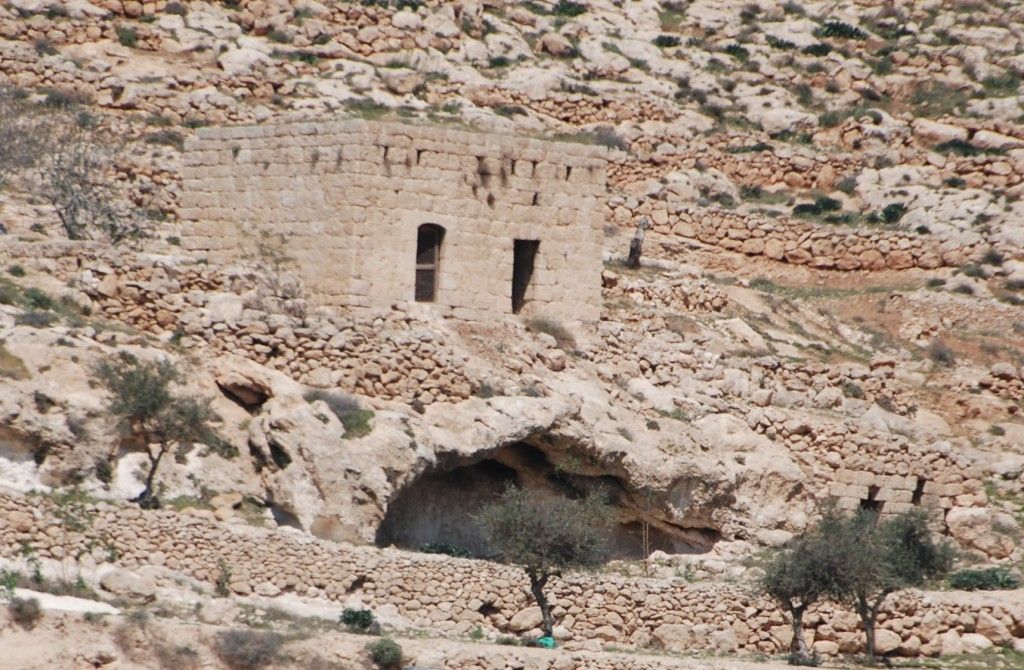
Continue Reading:


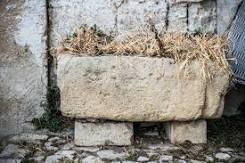
If you enjoy the information provided on this site, please consider making a donation of any amount to help continue its production. Donate Now
